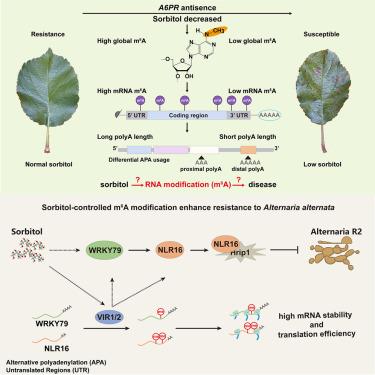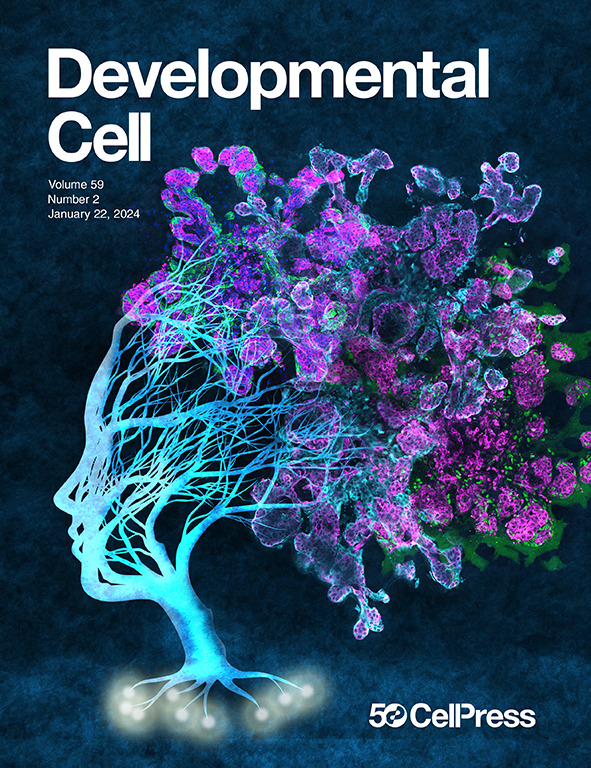Nanopore RNA direct sequencing identifies that m6A modification is essential for sorbitol-controlled resistance to Alternaria alternata in apple
IF 10.7
1区 生物学
Q1 CELL BIOLOGY
引用次数: 0
Abstract
Sorbitol, a main photosynthate and transport carbohydrate in all tree fruit species in Rosaceae, acts as a signal controlling resistance against Alternaria (A.) alternata in apple by altering the expression of the MdNLR16 resistance gene via the MdWRKY79 transcription factor. However, it is not known if N6-methyladenosine (m6A) methylation of the mRNAs of these genes participates in the process. Here, we found that decreased sorbitol synthesis in apple leaves leads to a transcriptome-wide reduction in the m6A modification, with fewer transcripts containing two or more methylation sites. We identified two methyltransferases, MdVIR1 and MdVIR2, that respond to sorbitol and A. alternata inoculation and positively control resistance to A. alternata. MdVIR1 and MdVIR2 act on MdWRKY79 and MdNLR16 mRNAs, and the resulting m6A modification stabilizes their mRNAs and improves translation efficiency. These data identify that m6A modification through MdVIR1 and MdVIR2 methyltransferases is essential for sorbitol-controlled resistance to A. alternata.

纳米孔RNA直接测序识别m6A修改对sorbitol-controlled至关重要阻力主产苹果
山梨糖醇是蔷薇科果树中主要的光合产物和运输碳水化合物,它通过MdWRKY79转录因子改变MdNLR16抗性基因的表达,是控制苹果对互花霉抗性的信号。然而,目前尚不清楚这些基因mrna的n6 -甲基腺苷(m6A)甲基化是否参与了这一过程。在这里,我们发现苹果叶片中山梨糖醇合成的减少导致m6A修饰的转录组范围内减少,含有两个或多个甲基化位点的转录本减少。我们发现了两个甲基转移酶MdVIR1和MdVIR2,它们对山梨醇和异花霉接种有反应,并积极控制异花霉的抗性。MdVIR1和MdVIR2作用于MdWRKY79和MdNLR16 mrna,由此产生的m6A修饰稳定了它们的mrna,提高了翻译效率。这些数据表明,通过MdVIR1和MdVIR2甲基转移酶修饰m6A对山梨醇控制的耐药是必不可少的。
本文章由计算机程序翻译,如有差异,请以英文原文为准。
求助全文
约1分钟内获得全文
求助全文
来源期刊

Developmental cell
生物-发育生物学
CiteScore
18.90
自引率
1.70%
发文量
203
审稿时长
3-6 weeks
期刊介绍:
Developmental Cell, established in 2001, is a comprehensive journal that explores a wide range of topics in cell and developmental biology. Our publication encompasses work across various disciplines within biology, with a particular emphasis on investigating the intersections between cell biology, developmental biology, and other related fields. Our primary objective is to present research conducted through a cell biological perspective, addressing the essential mechanisms governing cell function, cellular interactions, and responses to the environment. Moreover, we focus on understanding the collective behavior of cells, culminating in the formation of tissues, organs, and whole organisms, while also investigating the consequences of any malfunctions in these intricate processes.
 求助内容:
求助内容: 应助结果提醒方式:
应助结果提醒方式:


